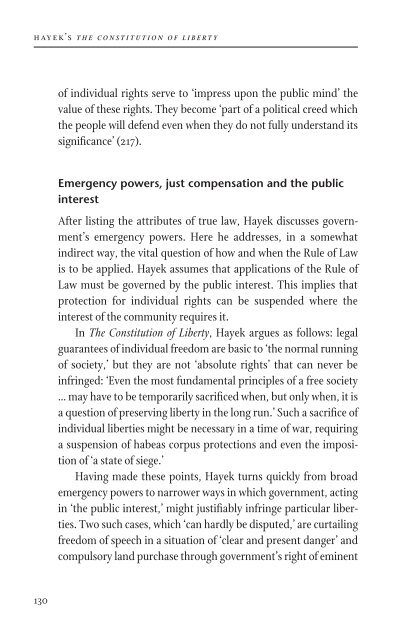Hayek's The Constitution of Liberty - Institute of Economic Affairs
Hayek's The Constitution of Liberty - Institute of Economic Affairs
Hayek's The Constitution of Liberty - Institute of Economic Affairs
Create successful ePaper yourself
Turn your PDF publications into a flip-book with our unique Google optimized e-Paper software.
h ay e k ’ s t h e c o n s t i t u t i o n o f l i b e r t y<br />
r e q u i r e m e n t s o f t h e r u l e o f l aw<br />
<strong>of</strong> individual rights serve to ‘impress upon the public mind’ the<br />
value <strong>of</strong> these rights. <strong>The</strong>y become ‘part <strong>of</strong> a political creed which<br />
the people will defend even when they do not fully understand its<br />
significance’ (217).<br />
Emergency powers, just compensation and the public<br />
interest<br />
After listing the attributes <strong>of</strong> true law, Hayek discusses government’s<br />
emergency powers. Here he addresses, in a somewhat<br />
indirect way, the vital question <strong>of</strong> how and when the Rule <strong>of</strong> Law<br />
is to be applied. Hayek assumes that applications <strong>of</strong> the Rule <strong>of</strong><br />
Law must be governed by the public interest. This implies that<br />
protection for individual rights can be suspended where the<br />
interest <strong>of</strong> the community requires it.<br />
In <strong>The</strong> <strong>Constitution</strong> <strong>of</strong> <strong>Liberty</strong>, Hayek argues as follows: legal<br />
guarantees <strong>of</strong> individual freedom are basic to ‘the normal running<br />
<strong>of</strong> society,’ but they are not ‘absolute rights’ that can never be<br />
infringed: ‘Even the most fundamental principles <strong>of</strong> a free society<br />
… may have to be temporarily sacrificed when, but only when, it is<br />
a question <strong>of</strong> preserving liberty in the long run.’ Such a sacrifice <strong>of</strong><br />
individual liberties might be necessary in a time <strong>of</strong> war, requiring<br />
a suspension <strong>of</strong> habeas corpus protections and even the imposition<br />
<strong>of</strong> ‘a state <strong>of</strong> siege.’<br />
Having made these points, Hayek turns quickly from broad<br />
emergency powers to narrower ways in which government, acting<br />
in ‘the public interest,’ might justifiably infringe particular liberties.<br />
Two such cases, which ‘can hardly be disputed,’ are curtailing<br />
freedom <strong>of</strong> speech in a situation <strong>of</strong> ‘clear and present danger’ and<br />
compulsory land purchase through government’s right <strong>of</strong> eminent<br />
domain. 1 Hayek goes on to insist that such cases should conform<br />
to a rule, so that they can be reviewed by an independent court,<br />
and that individuals who are affected should receive full compensation,<br />
both as a matter <strong>of</strong> justice and as a deterrent to government<br />
arbitrariness (217–18).<br />
Hayek’s third Cairo Lecture makes roughly the same points,<br />
but with this important difference: it <strong>of</strong>fers a much more detailed<br />
rationale for emergency powers. As Hayek reminds us, the Rule <strong>of</strong><br />
Law establishes a sphere ‘in which the individual can follow his own<br />
will’ and also know clearly ‘the conditions and the manner in which<br />
he can be coerced.’ Nevertheless, the individual’s private sphere is<br />
not sacrosanct under all conditions. Exceptional circumstances will<br />
arise ‘in which it would be in the highest interest <strong>of</strong> the Community<br />
that particular individuals should be made to do things as a result <strong>of</strong><br />
events which they do not know and in a manner for which no rule<br />
provides.’ <strong>The</strong>se exceptional circumstances include ‘natural catastrophes’<br />
and ‘war or other sudden dangers.’ Such events call for<br />
swift and concerted action, so that even the private citizen may be<br />
required to ‘place himself under the command <strong>of</strong> authority.’<br />
Emergency powers must be exercised by ‘guardians <strong>of</strong> the<br />
public interest.’ <strong>The</strong>se guardians must be kept in check, however,<br />
by an independent court, which will ‘decide on general abstract<br />
principles not only about the legitimacy <strong>of</strong> the interference but<br />
also about the appropriate compensation.’ <strong>The</strong> community, which<br />
benefited from the exercise <strong>of</strong> emergency powers, must bear the<br />
cost <strong>of</strong> compensating the individual fully for every infringement<br />
<strong>of</strong> his right <strong>of</strong> private property or <strong>of</strong> ‘other legally acquired rights’<br />
(1955: 44–5).<br />
1 ‘Eminent domain’ is the phrase <strong>of</strong>ten used in the USA to describe what is generally<br />
known simply as ‘compulsory purchase’ in the UK.<br />
130<br />
131












